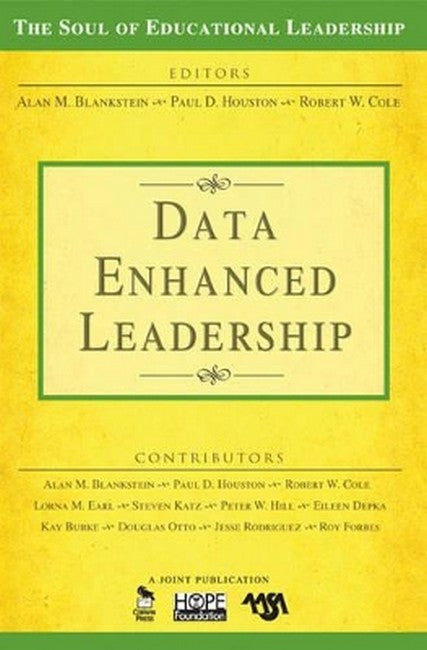Award-winning author and educational leader, Alan Blankstein served for 25 years as President of the HOPE Foundation, which he founded and whose honorary chair is Nobel Prize winner Archbishop Desmond Tutu. A former "high-risk" youth, Alan began his career in education as a music teacher. He worked for Phi Delta Kappa, March of Dimes, and Solution Tree, which he founded in 1987 and directed for 12 years while launching Professional Learning Communities beginning in the late 1980s. He is the author of the best-selling book Failure Is Not an Option (R): Six Principles That Guide Student Achievement in High-Performing Schools, which received the Book of the Year award from Learning Forward. Alan is Senior Editor, lead contributor, and/or author of 18 books, including Excellence Through Equity with Pedro Noguera,. He also authored some 20 articles in leading education print including Education Week, Educational Leadership, The Principal, and Executive Educator. Alan has provided keynote presentations and workshops for virtually every major U.S. Ed Org, and throughout the UK, Africa, and the Middle East. Alan has served on the Harvard International Principals Centers advisory board, and the Jewish Child Care Agency, where he once was a youth in residence. Paul D. Houston has established himself as one of the leading spokespersons for American education through his extensive speaking engagements, published articles, and his regular appearances on national radio and television. Formerly executive director of the American Association of School Administrators from 1994 to 2008, Houston has served as a teacher and building administrator in North Carolina and New Jersey. He has also served as assistant superintendent in Birmingham, Alabama, and as superintendent of schools in Princeton, NJ; Tucson, AZ; and Riverside, CA. Houston has served in an adjunct capacity for the University of North Carolina, Harvard University, Brigham Young University, and Princeton University. He has served as a consultant and speaker throughout the United States and overseas, and he has published more than 100 articles in professional journals. Robert W. Cole is proprietor and founder of Edu-Data, a firm specializing in writing, research, and publication services. He was a member of the staff of Phi Delta Kappan magazine for 14 years: assistant editor 1974-1976, managing editor 1976-1980, and editor-in-chief 1981-88. During his tenure as editor-in-chief, the Kappan earned more than 40 Distinguished Achievement Awards from the Association of Educational Publishers, three of them for his editorials. Since leaving the Kappan, Cole has served as founding vice president of the Schlechty Center for Leadership in School Reform (1990-1994). At CLSR he managed districtwide and communitywide school reform efforts and led the team that created the Kentucky Superintendents' Leadership Institute. He formed the Bluegrass Leadership Network, in which superintendents worked together to use current leadership concepts to solve reform-oriented management and leadership problems. As senior consultant to the National Reading Styles Institute (1994-2005), Cole served as editor and lead writer of the Power Reading Program. He and a team of writers and illustrators created a series of hundreds of graded short stories, short novels, and comic books from Primer through Grade 10. Those stories were then recorded by Cole and Marie Carbo; they are being used by schools all across the United States to teach struggling readers. Cole has served as a book development editor for the Association for Supervision and Curriculum Development (ASCD), for Corwin Press, and for Writer's Edge Press. He has been president of the Educational Press Association of America and member of the EdPress Board of Directors. He has presented workshops, master classes, and lectures at universities nationwide, including Harvard University, Stanford University, Indiana University, Xavier University, Boise State University, and the University of Southern Maine. He has served as a special consultant to college and university deans in working with faculties on writing for professional publication. Recently he began serving as managing editor and senior associate with the Center for Empowered Leadership.
Request Academic Copy
Please copy the ISBN for submitting review copy form
Description
About the Editors About the Contributors Introduction 1. Using What You Know to Be a More Effective Leader - Paul Houston 2. Creating a Culture of Inquiry: Harnessing Data for Professional Learning - Lorna Earl, Steven Katz 3. Using Assessment Data to Lead Teaching and Learning - Peter Hill 4. Institutionalizing the Use of a Four-Letter Word - Eileen Depka 5. Using Data to Drive Instruction and Assessment in the Standards-Based Classroom - Kay Burke 6. Data: One District's Journey - Doug Otto 7. Information and Communications Technology in Education - Jesse Rodriguez 8. Some Pitfalls in the Use of Data-and How to Avoid Them - Roy Forbes Index
"Data have enormous power to improve the quality of decisions, but leaders are the ones who drive decision making in schools. Data are tools for leaders. This volume is akin to lifting the hood of your car to gain a more complete understanding of how it runs, and how it can be fine-tuned to run even better." -- From the Introduction by Robert W. Cole "A great resource for district leaders for understanding that data should not be used to place blame or grant glory, but rather should be applied as a tool, to constantly focus on systemwide improvement." -- The School Administrator, November 2010, Vol. 67(10)

